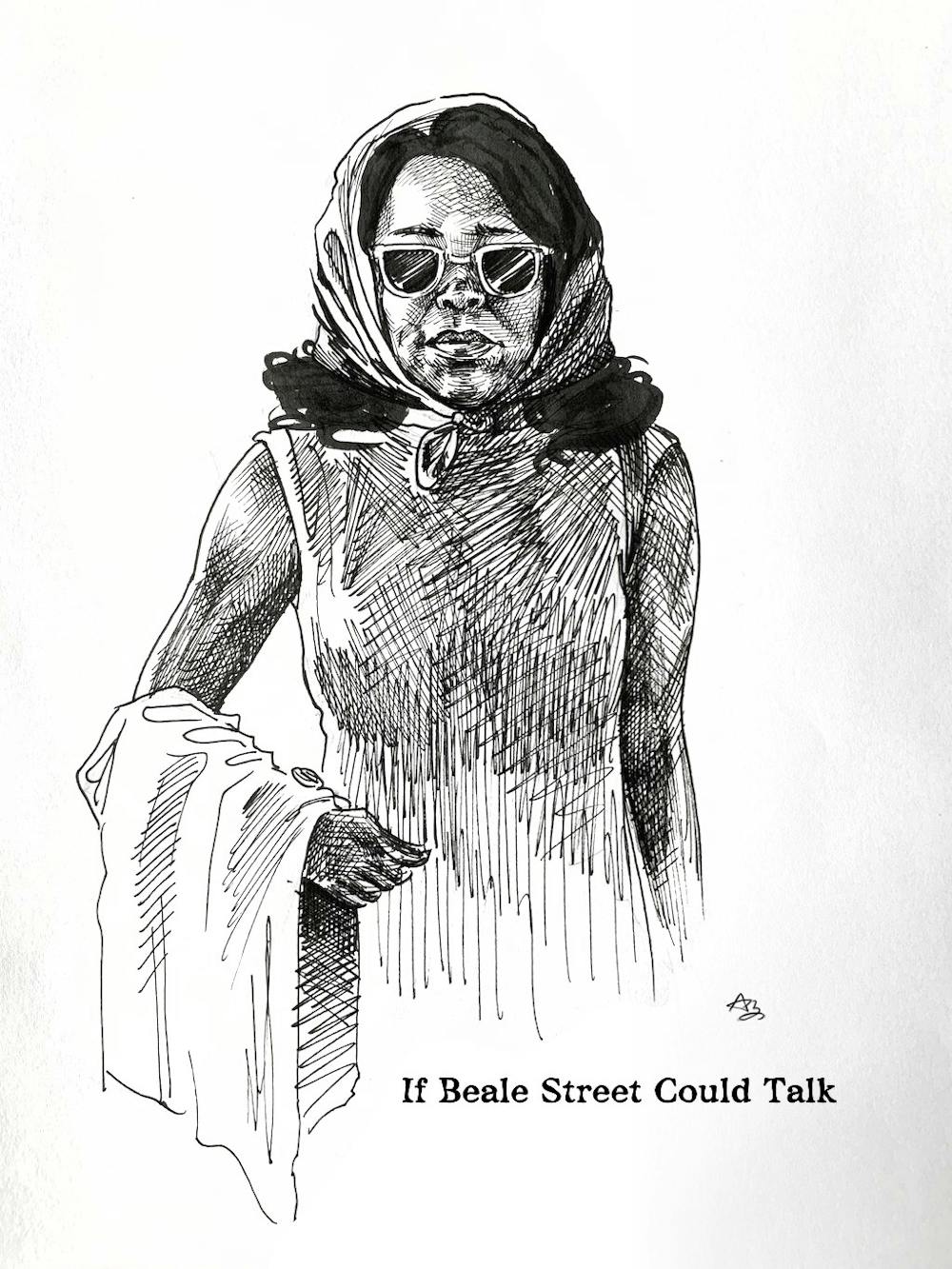“I hope that nobody has ever had to look at somebody they love through a glass,” narrates Clementine “Tish” Rivers (KiKi Layne) as the camera pans from a close-up shot of Tish and her lover, Alfonzo “Fonny” Rivers (Stephan James), embracing in the sunlight’s warm glow, to Fonny being guided by a police officer to greet Tish through the glass window of a dimly lit prison.
Based on the seminal James Baldwin novel of the same name, Barry Jenkins’ “If Beale Street Could Talk” (2018) mesmerizes viewers with Jenkins’ Academy Award-winning directing, the actors’ poignant performances, and composer Nicholas Britell’s rich, melancholy score.
The film revolves around the intimate relationship between lifelong-friends-turned-lovers Tish Rivers and Fonny Hunt, who live in Harlem in the 1970s. The central conflict of the film arises when Fonny is baselessly accused of sexually assaulting a Hispanic woman named Victoria Rivers (Emily Rios). He is subsequently arrested, despite his well-established alibi and the authentic testimonies offered by Tish and Fonny’s friend Daniel Carty (Brian Tyree Henry). In a series of events that illustrates the malicious nature of a criminal justice system that disproportionately targets Black individuals and that refuses to recognize their basic humanity, white police officer Bell (Ed Skrein) — out of deep-seated racial animosity — coerces Victoria into selecting Fonny amid a line-up of potential assailants, thereby precipitating the event that upends the relative bliss that Fonny and Tish had enjoyed thus far.
When Tish visits Fonny at the jail he’s been confined to until the official trial date, Tish presents Fonny with news that simultaneously introduces euphoria and apprehension into their lives: Tish is pregnant. The plot is driven by the oppressive uncertainty that lingers over the two lead characters’ future together as the date of Fonny’s trial looms overhead. The events that transpire attest to both the cruelty of a world averse to ensuring the welfare of Black individuals and the magnitudes of love that can continue to flourish even under dire circumstances that threaten to compromise its strength.
Regina King’s stirring performance as Tish’s mother, Sharon — a compassionate woman cognizant of the injustices that have befallen her daughter’s lover and eager to rectify them — garnered her an Academy Award for Best Actress in a Supporting Role. Those who have enjoyed the privilege of viewing “If Beale Street Could Talk” will have no trouble discerning why: while Tish’s and Fonny’s magnetic synchrony undergirds the film, Sharon’s momentous travel to Puerto Rico where she initiates a jolting confrontation with Victoria serves as the film’s definitive climax.
Barry Jenkins’ directorial ingenuity is palpable in every second of the film in its evocative hues, slow-burning tempo, and non-linear plotline. With respect to the coordination of colors, Tish’s and Fonny’s clothing invariably complement one another, as if to illustrate how their consummate love allows them to seamlessly merge together. Moreover, the neon glow of downtown Harlem lights and warm ambiance of the Rivers household grant the film’s different settings nuanced auras and emotions. Instead of a chronological progression of events, the film’s flitting back and forth between the past and the present immerses viewers in the unfolding drama at the heart of the film in a manner akin to a sewing needle delicately maneuvering in and out of fabric.
The cast’s glistening performances transport the viewers to a realm where unconditional love permeates the air. In one scene during the earlier stage of their romance, Fonny clutches a red umbrella as he speaks fondly to Tish, and as the umbrella envelops them, it seems to represent the mutual acceptance and admiration provided by true love. Throughout the film, Tish and Fonny exchange enraptured smiles and tender confessions of their unrelenting affection for one another. The gradual nurturing of their relationship is encapsulated in these little moments that constitute remarkable on-screen chemistry. During the scenes when the tension among characters rises to the fore, the actors’ impassioned tones and vehement actions prove jarring, not least because they diverge so drastically from the blissful atmosphere of love and affection that pervades much of the film.
As a follow-up to his Academy Award-winning film “Moonlight” (2016), “If Beale Street Could Talk” affirms Jenkins’ reputation as a brilliant director who specializes in suffusing his films with breathtaking imagery and unflinching themes of racial injustice that continue to bear immense relevance to a contemporary audience.

In a year that has witnessed the deaths of Ahmaud Arbery, Breonna Taylor, George Floyd, and Rayshard Brooks at the hands of law enforcement officials — among countless other Black victims of police brutality throughout the nation and around the world — the film’s depiction of a U.S. criminal justice system that reserves no regard for the plight of Black individuals who have historically failed to benefit from this ostensibly “just” institution is frightening and all too real.
Certain scenes of the film are interlaced with meditations on the prejudice and endangerment that Black individuals face. In the first few minutes of the film, Tish narrates in a somber tone how Fonny’s budding career as a wood sculptor allowed him to evade the “death that awaited the children of our age.” Suddenly, an array of black and white photographs flits across the screen, with a second allotted to each image’s exhibition. These photos depict prevalent instances of racial injustice perpetrated by a justice system that’s anything but just: in one, a Black man gazes despondently through the bars of the jail cell he’s trapped in, and in another, two white police officers restrict the movements of a Black man whose facial expression betrays intense agony.
This grim montage recurs toward the film’s end, albeit with a slightly different selection of black and white photographs conforming to the themes of racial injustice that comprise the movie’s central conflict. Overall, Jenkins’ focus on Tish’s and Fonny’s jeopardized union serves to encapsulate the broader dilemmas faced by Black individuals in a society that brutally inflicts long-lasting damage on their ability to sustain their most important relationships. While Tish’s and Fonny’s strong love survives despite the considerable adversities that they face, others aren’t so lucky.
In another arresting scene, Fonny sits down with his friend Daniel as the latter recounts the taxing experience he endured in prison after being wrongly sentenced for stealing a car. As Daniel reflects on the injustice of his arrest and subsequent incarceration, Fonny stares solemnly ahead, unblinking. As an act of ominous foreshadowing, this scene sends chills down prescient viewers’ spines.

In addition to the vivid directing and arresting performances, the somber soundtrack of the film compounds its intensity. Britell, the composer of the film’s score, elaborated on his artistic decisions as stemming from a desire to convey the jazz undertones of Harlem’s early music scene and the transporting rhythms of love. To juxtapose Tish’s and Fonny’s powerful love with the pernicious threats that strive to imperil their happiness, Britell composed the score such that it alternates between vibrant string melodies and brass harmonies. The resultant effect is a multitudinous string of music that establishes the significance of each and every scene in the film.
Baldwin’s literary work reflects his convictions that American society had failed to live up to its standards of equality and justice for all. The author and civil rights activist’s yearning for a reckoning with the ingrained racism in America is wondrously exemplified in Jenkins’ film. The convergence of exquisite scene assemblages, riveting performances, and wistful music produce a film that’s not only an understated masterpiece, but a gut-wrenching portrayal of the prejudices that pervade the criminal justice system and the society that relies upon it.
The USG Movies program, sponsored by Undergraduate Student Government, typically brings films to the Princeton Garden Theatre for free student viewing. The program has adapted to the virtual semester by unlocking a new movie and discussion topic each Thursday via a Canvas site and hosting a discussion of the week’s movie each Saturday at 9 p.m. ET. All films can be streamed for free by University students.








